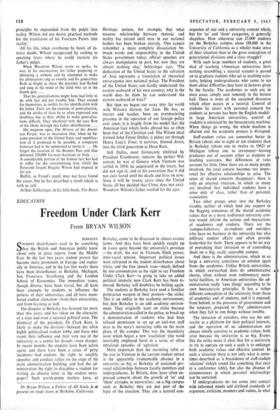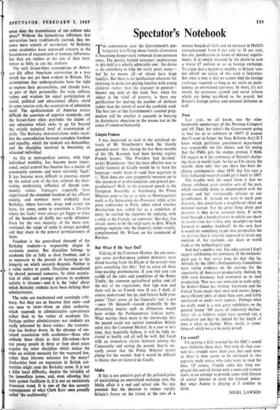Freedom Under Clark Kerr
EDUCATION From BRYAN WILSON
BERKELEY
The disquiet at Berkeley has festered for more than two years, and has taken on the character of a state and even a national political issue. The dismissal of the president, Dr Clark Kerr, is likely to make the division—between the often highly politicalised student lobby and those who resent their influence and their very use of the university as a centre for dissent—even sharper. In recent months the students have been active again, and there have been a series of petty incidents—had students the right to amplify speeches and conduct rallies on the steps of the main administration building, and had the ad- ministration the right to discipline a student for writing an abusive letter to the student news- paper? Such parish-pump matters have, at
Dr Bryan Wilson, a Fellow of All Souls, is at present on study leave at Berkeley, California. Berkeley, come to be discussed in almost cosmic terms. And they have been quickly caught up in issues quite beyond the university's province —the draft, the war in Vietnam, black power, inter-racial tension. Important political issues were refracted in the student disturbances about trivia, and the free speech issue—nicely defined by one commentator as the right to say Freedom Under Clark Kerr—is going to take on added political intensity now Clark Kerr has been re- moved. Berkeley will doubtless be boiling again.
The students at Berkeley have used a familiar proletarian weapon in their protests—the strike. This is an oddity in the academic environment, but then Berkeley is an odd academic environ- ment. They originally went on strike because the administration called in the police, to break up a demonstration of students who had been refused permission to set up an anti-war stall near to the navy's recruiting table on the main plaza of the campus. This was the incendiary issue which began a new 'escalation' (the word inevitably employed here) in a series of often unrelated episodes of agitation.
More important than the recruiting table or the war in Vietnam in the current student unrest is the apparently irredeemable absence in a university as big as Berkeley of sustained per- sonal relationships between faculty members and undergraduates. In Britain, dons have often ex- pressed concern about the growth of `us' and `them' attitudes in universities: on a big campus such as Berkeley they are just part of the logic of the situation. They are a natural con- sequence of size and a university context which, but for `us' and 'them' categories, is generally shapeless. How otherwise can 27,000 students on the Berkeley campus alone (88,000 in the University of California as a whole) make sense of their situation than in the gross conception of generational divisions and a class struggle?
With such large numbers of students, a great deal of teaching (American universities have nothing resembling a tutorial system) is passed on to graduate students who act as teaching assis- tants, helping undergraduates who come to see them about difficulties they have in lectures given by the faculty. The academics as such are, in most cases, simply seen remotely in the lecture hall. There is none of the sustained discourse which often occurs in a tutorial. Control of students by tutors with personal concern for students as persons has been the English model: in large American universities, control of students is exercised by the bureaucratic machine. When things go wrong, the whole machine is affected and the academic process is disrupted.
Staff-student ratios are somewhat better in Britain (about one to eight or ten students) than in Berkeley (about one to twelve in 1962) or Michigan (about one to seventeen)—leaving graduates out of account either as students or teaching assistants. But differences of ratio account for little. Once there are so many people involved, the total context becomes too imper- sonal for effective relationships to arise. The sense of shared concerns disappears: there is only an external situation, in which so many are involved that individual students have a sense only of class, rather than of personal, association.
Two other groups enter into the Berkeley trouble, neither of which lend any support to the flagging consensus of the shared academic values that in a more traditional university con- text would inform the actions and interactions of academics and students. There are the 'campus-followers,' ex-students and outsiders who have no business in the university but who infiltrate student affairs and often provide leadership for them. There appears to be no way of preventing their intrusion or of controlling them on a big, easily accessible campus.
And there is the administration, which in so large a university constitutes an echelon apart from the academics. Unlike British universities, in which overworked dons do administrative chores, often without even rudimentary secre- tarial facilities, in American universities the ad- ministration really 'runs things' according to its own bureaucratic principles. It has a rather different conception of the university from those of academics and of students, and it is exposed, from behind, to the pressures of government and the taxpayer, prepared to 'fire' administrators when they fail to run things without trouble.
The intrusion of outsiders, who use the uni- versity as a platform for their political interests, and the operation of an administration not always wholly sensitive to academic values, both arise because the university is so big. Events like the strike make it clear that for a university to try to operate on such a scale is to endanger both academic values and effective control. In such a situation there is not only what is some- times described as 'a breakdown of staff-student relations' (which sound like something that exist at a conference table), but also the absence of circumstances in which personal relationships can be sustained.
If undergraduates do not come into contact with informed minds and civilised standards of argument, criticism, manners and values, in what sense does the transmission of our culture take place? Without the humanising influences that universities have traditionally exerted, they be- come mere schools of instruction. At Berkeley some academics have expressed concern at the breakdown of transmission of humane influences, but they are victims of the size of their insti- tution as fully as are the students The tacit laissez-faire assumptions of Ameri- can life affect American universities in a way which has not yet been evident in Britain. The assumptions that undergraduates have the right to express their personalities, and already have, as part of their personality, the taste, culture, values and wisdom for equal participation in social, political and educational affairs, stand in some tension with the assumption of education itself. The egalitarianism of America makes difficult the assertion of superior standards, and the laissez-faire ethos precludes the claims of any education which seeks to go far beyond the strictly technical level of transmission of skills. The Berkeley demonstrations make mani- fest the contradiction between complete freedom and equality, which the students are demanding, and the discipline involved in becoming an educated individual.
As life in metropolitan centres, with high individual mobility, has become more imper- sonal, social control has become less a matter of community customs and more narrowly 'legal.' It has become more difficult to exercise, except by the naked arm of the law, without the inter- vening moderating influence of shared com- munity values. Teenagers especially have experienced the extended freedom of the affluent society, and nowhere more evidently than Berkeley, where hot-rods, drugs and casual sex have, for some, come to constitute a life-style where the 'kicks' must always get bigger to stave off the boredom of thrills too easily obtained. Even for the vast majority of the more con- ventional, the range of styles is always paraded, and they share in the general permissiveness of them.
Freedom is the generalised demand of the Berkeley students—a respectable slogan in academic society. But discipline belongs to academic life as fully as does freedom, and is as necessary to the pursuit of learning as the integrity on which research depends. Neither is a value native to youth. Discipline unmediated by shared personal concerns, by close associa- tion of older and younger persons in academic activity is irksome—and it is the 'rules' about which Berkeley students have been defying their administrators.
The rules are mechanical and seemingly arbi- trary, but. they are so because they stem—and are seen to stem—from an alien authority, which responds to administrative convenience rather than to the values of academic life. Perhaps neither administrators nor students are really informed by those values: the transmis- sion has broken down. In the absence of sus- tained association with academics—those who embody these ideals as their life-values—how can young people in three or four short years acquire the inner discipline which makes the rules an evident necessity for the wayward few, rather than irksome nuisance for the many? Authorities bent on expansion in British uni- versities might note the Berkeley scene. It is not a little local difficulty, despite the triviality of the immediate issues, and, even allowing that their system facilitates it, it is not an exclusively American trend. It is one of the less savoury consequences of what Clark Kerr once proudly called 'the multiversity.'































 Previous page
Previous page